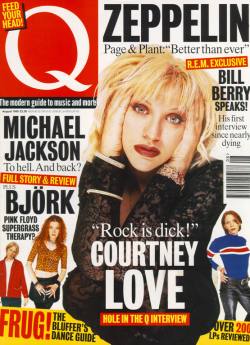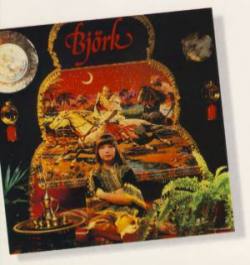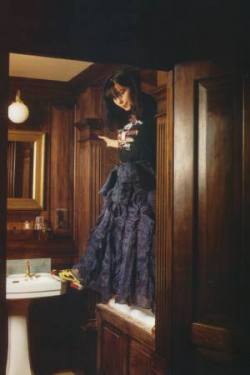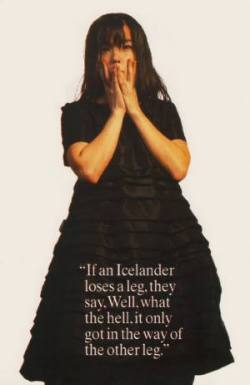Q 8/95
ALL TOGETHER NOWInterview by Stuart Maconie
|
|
To be frank, though, Iceland makes Belgium seem positively crammed with celebrities. The averagely culturally aware Brit will know two Icelanders. A poor tally but still one more than our cousins across the pond who haven't even heard of Magnus Magnusson and "I've started so I'll finish". The world's most famous Icelander, the world's only famous Icelander, is Ms Björk Gudmunsdottir. 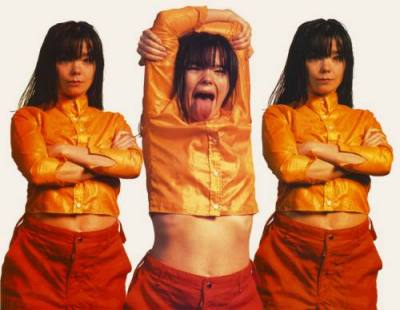
She glories in the sing-song rhythms of Scandinavian speech yet she's also learned that little raised note at the end of a sentence that's as much a music biz standard feature as the pony tail and the mobile phone. And she is every bit as likely to say "Respect due to Gilles Peterson and Tricky" as she is to claim "In my heart I yearn for the leaden skies and fiery peaks of my forefathers' land". Though she's pretty likely to say that too. Most of the world's record buyers know Björk as the talent behind Debut, an LP that introduced a startling new personality to the global stage. A smaller, smarter sub-section know that she was the voice of the spectacularly idiosyncratic Sykomularnir or Sugarcubes. But only a very few know that Björk's own colourful saga goes back further still. To 1977. And the first chapter bears the legend "The Icelandic Lena Zavaroni It's OK To Like." Contrary to myth, Björk did not grow up in a commune but, nevertheless, spent her formative years surrounded by seven benevolent hippies. "They all had normal jobs but they all wanted to change the world. It was great for a kid. I knew who to go to if I needed kindness, who to go to for a laugh, who to go to if I wanted to hear a particular kind of music. It was very free. And there was a very warm vibe which kids intuitively pick up on. If I fancied eating bananas for two days, that was cool. One day I didn't want to get out of bed so I cut a hole in my bedsheet, put it over my head and went to school like that." Miraculously, given this fail-safe recipe for brattishness, Björk grew up a self-sufficient, single-minded, rather shy little girl with curious musical tastes. "Hendrix, The Beatles, The Who, Janis Joplin, all that normal stuff. I was also in love with Edgar and Johnny Winter and their weird eyes. At seven I was obsessed with Sparks, who I thought were very Oriental and theatrical. Them and the sleeve to Sgt. Pepper's Lonely Hearts Club Band." She describes herself as "a freak who was born singing". She was also, like most other Icelandic youth, a criminal, in that she listened to the radio station emanating from the hated US naval base ("if those poor sailors had left the base to go for a drink, they would have been slaughtered"), an act illegal for native Icelanders. "The state-run station was very proper and serious and played one hour of pop a week, which meant Abba, so the naval base station was really popular. Fuck politics. People just wanted to listen to music." At five, Björk attended a music school noted for its liberal regime and began to write songs articulating such classic scenes of toddler angst as one's grandmother falling out with the butcher and, possibly, going to school in a bedsheet having eaten nothing but bananas for two days. "They were no Bohemian
Rhapsodies but they were really natural little songs. I wasn't a show-off
but, just like one kid in school always tells the jokes, I was the kid who
always sang.
Anyway, some radio people came to make a documentary about
this weird school and I was on there as the girl who sings." Björk herself candidly admits that this may have been as much to do with her stepfather - Saevar Arnason was a star performer in the band Pops, where he was considered the Icelandic Jimi Hendrix and nicknamed after the Icelandic for the whammy bar - as for any nascent musical genius. She had grown up crayoning pictures backstage for roadies and so had developed an early knack for the rock'n'roll life. "I was very stubborn and opinionated," she remembers. "The record label offered me all these songs and I turned them down because they were shit. I got very upset in the end my mum rang round her hippy musician mates and they all came up with songs for me. So the best songwriters in Iceland contributed to this upstart kiddy's record. And I chose the songs," she adds proudly, remembering a level of artistic control George Michael might envy.
The album Björk, with a sleeve featuring the 11-year-old dressed as Oriental mandarincum-Mongol seer in a Dungeons & Dragons fan's idea of a bordello, was released on Falkinn records (now, strangely, a bicycle manufacturer) at Christmas 1977 and promptly went platinum. Copies fetch £500 these days and those in the know speak of it as being musically much more palatable than standard lisping (sub-)teen sensation fare and, in fact, a competent, approachable pop artefact of its era. Clearly, Björk's earlier fixations have not faded, for one track is a cover of Edgar Winter's Alta Mira. "The record became very big - certainly big enough for me to know that I didn't want any of it. I actually hated being recognised in the street and kids wanting to be my friends because the thing that it was based on wasn't my own work. I only wrote one of the songs. So I cut myself off from music until I was 13. Then punk happened and I went bonkers."
First with
Exodus and then with Tappi Tikarras, Björk continued to plough her furrow
in Icelandic pop. Then in 1984, she joined Kukl alongside future Sugarcubes
Einar and Siggi. Iceland places a high degree of value on art, culture and
literature and these rebellious youth were the bright young things of the
country's counter-culture.
"If you go to Iceland now, these are all the
people who are running the art galleries and the magazines, the fashion
designers and the photographers. We all came out of this very exciting
scene. You could only buy Michael Jackson in Iceland so we managed bands,
organised gigs, formed labels, opened record shops.
"Then in 1986, the
label went bankrupt and Kukl quit and I was heartbroken. Crying for days.
Much more upset than I've been over any boyfriend. But things began to
happen. I bought a house with my then boyfriend and I had a kid. Our house
became like a cafeteria for all these people looking for something new to
do. And we formed this organisation called Bad Taste, where we reacted
against all this punk dressing down and being socially correct. We wore
pink and encouraged irresponsibility and had these mottoes like 'World
Domination Or Death'. Einar drove a huge, impractical convertible and
everyone hated us. It was a magical time, and out of this grew the
Sugarcubes." Most people agree on the ear-pricking excellence of the Sugarcubes' Birthday, the song that brought Björk's voice to the attention of the world. After that, opinions differ. To some, the Sugarcubes were eccentric, engaging pranksters who illuminated the dour indie scene. To many others, they were an irritating bloke called Einar shouting something incomprehensible at you through a megaphone. To Björk, they were something else again. "I always saw the Sugarcubes as a party band, a piss take. I don't want to sound like I'm dissing them but it wasn't serious music for me. I used to look around me and think, These people should be writing novels, not doing bass solos in Texas. We held out against the majors for two years but in the end we gave in. I was very ambiguous but I felt I couldn't let the others down. And as the group went on, I felt that I had to do my own thing.
"I was faced at that time with an awful choice: my friends or my music. I'm not saying the Sugarcubes had no worth. I'm not saying that all music has to be like . . ." - she struggles for the appropriate analogy - ". . . like cutting out your heart and putting it on a plate, but I knew that I needed to express everything in my music." She pulls a wry expression. "I'm a ridiculous person, over-romantic and dramatic, so you'll have to forgive me but I felt I had to go on a journey on my own. I dreamed I'd meet my musical other half, but if not, then I was to have to go it alone." Going it alone meant leaving the Sugarcubes in September 1992 and furthermore leaving Iceland for Britain. "Everything had to be right. I couldn't take any chances, so I got my son and I came here. It was very scary and very exciting. I was taking my kid away from his friends and everything for a little rented room in Belsize Park. But my songs felt like children to me. You want the best for your kids, the best education, the warmest clothes, the best food. I wanted the best for my songs and that meant coming here. But I didn't know what to do, so I rang up Graham Massey of 808 State." She had first met and worked with Massey on Oops from the Mancunian's 1991 album, Ex-El. Even so, he was hardly a bosom pal or fellow Icelander. "I was very isolated and unsure. I really did feel like a virgin." Advance tapes of Björk's first original solo album since her teenage hit started to circulate in the spring of 1993 (though she had recorded Gling-Glo, an album of jazz standards with the Trio Gudmundar Ingolfssonar in 1990). It was an amalgam of a decade's worth of obsessions ranging from Debussy and Rahsaan Roland Kirk to the World Saxophone Quartet and House. The "buzz" was instantaneous. "I got these very unusual reactions. People were saying, It's going to be a very special record, very big, and I thought, Oh, really? OK, if you say so. It didn't feel like entering the mainstream at all for me. I thought that the Sugarcubes were the crowd-pleasers, the fun band, the ones who should be popular. Debut felt a very selfish thing. Very personal. We expected it to sell a third as much as a Sugarcubes record." In the event, it sold about 30 times as much, finding its way into the record collections of folks who would have run a mile, fingers jammed in ears, from the second Sugarcubes album and Einar's unfettered vocal stylings. Björk gained icon status; there was talk of a Sade of the '90s with all that that implies. Björk, waifish in a shapeless jersey and cheeks dotted with those strange little tears of zinc, gazed soulfully out from bedroom wall and forecourt rack. Over the last few years, she and Paul Weller have seemed to be the style press equivalent of the little man and woman in the weather house; when one disappears from the cover of The Face, the other one pops up. Björk had become public property all over again, a star a second time before she was 30 and this time outside of Lydvelid lsland. "lt did feel like a victory. All the better because I'd done it myself. I think maybe I learned something being a singer since I was 11. If you try to please a lot of people, you'll please no-one. If you just do it for yourself, people will like it." All the songs on Post have been written in that scary, exciting two years
since leaving Iceland. So Post is a telegram, a shout back to Iceland to
tell them how my life is now." Army Of Me not only sounds fabulous - Led Zeppelin and techno welded together into a surging, operatic whole - but possesses a briskly pull-yourself-together tone. "Stand up, you've got to manage .../You're all right, there's nothing wrong/...get to work/and if you complain once more, you'll meet an army of me." As Björk explains it, herself and Massey set out to write a heavy metal song with a difference.
"Imagine you're in a club full
of heavy metal types and grunge people; Army Of Me is like someone's granny
blasting out over the PA and saying, 'Snap out of it! Stop whining! Wash
your hair! Smarten yourself up!'".
These are bold and refreshing sentiments
for a rock song. Refreshingly Icelandic sentiments.
"Charles Bukowski and
Morrissey are not big in Iceland. Self-pity, suicide. . .forget it. I like
to surround myself with people who are fierce and physical and have a duty
to be optimistic. If an Icelander loses a leg, they say, Well, what the
hell; it only got in the way of the other leg anyway. Remember, we were
living in the middle ages until recently. Icelanders lived in mud houses
until the early part of this century. Difficult winters, Danish oppression,
no animals, severe taxes. Icelandic people are very extreme. What's the
point in drinking a glass of wine a day? It's a waste of money, a waste of
time, a waste of wine. Better to drink a litre of vodka once a week and do
it properly, really get out of it. I miss all that. I'd rather go all the
way once a month, end up naked on a bar table, climbing fences and swimming
in someone's pool.
"When I first came here as a teenager, I thought it was
horrible. Grease everywhere,no colours, trees. . .I found it very
claustrophobic. I was washing my face three times a day. And I was very
insular. I was like the woman in The Piano. I hated cities. Reykjavik is a
city but wherever you are, you can walk for 10 minutes and end up somewhere
where you can scream at the top of your voice and no-one will hear you."
Though she's obviously become a creature of London, she candidly admits to missing Iceland. "When I moved here," she recalls, "I said I'd allow myself two luxuries. Free airline tickets for friends if they wanted to visit me and unlimited phone bills, even if I'm in Japan and I want to just ring a friend for an hour's worth of stupid jokes." Björk was last in Reykjavik at
Christmas for an idyllic month.
"As soon as I got back, I felt right. Felt
that I belonged, deep in the meat of me. No spaghetti piles of faxes, no
messages on the answering machine. And very extreme people. Here I pick up
a paper and they say I'm mad, they call me an elfin freak. But back there,
I'm the quiet one."
|
